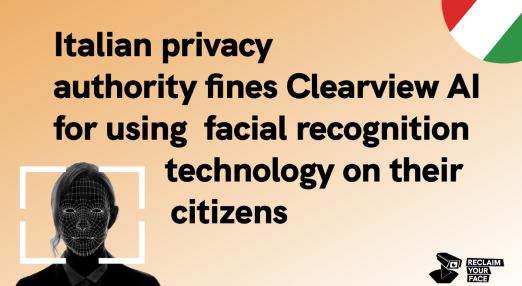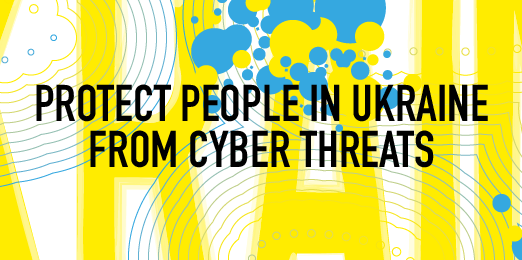Our work
EDRi is the biggest European network defending rights and freedoms online. We work to to challenge private and state actors who abuse their power to control or manipulate the public. We do so by advocating for robust and enforced laws, informing and mobilising people, promoting a healthy and accountable technology market, and building a movement of organisations and individuals committed to digital rights and freedoms in a connected world.
Filter resources
-

Electronic monitoring using GPS tags: a tech primer
Electronic tags have been a key part of criminal justice for many years throughout the world. As traditional radio-frequency tags are replaced by GPS ankle tags, we examine how these different technologies work and the seismic shift that will result from 24/7 location monitoring and data analytics, enabled by GPS tags.
Read more
-

Italian DPA fines Clearview AI for illegally monitoring and processing biometric data of Italian citizens
On 9 March 2022, the Italian Data Protection Authority fined the US-based facial recognition company Clearview AI EUR 20 million after finding that the company monitored and processed biometric data of individuals on Italian territory without a legal basis. The fine is the highest expected according to the General Data Protection Regulation, and it was motivated by a complaint sent by the Hermes Centre in May 2021 in a joint action with EDRi members Privacy International, noyb, and Homo Digitalis—in addition to complaints sent by some individuals and to a series of investigations launched in the wake of the 2020 revelations of Clearview AI business practices.
Read more
-

The European Commission might put a stop to end-to-end encryption
The European Commission is working on a bill that requires platforms to monitor all your chats. This would undermine the essence of end-to-end encryption. What's up with that?
Read more
-

Leaked opinion of the Commission sets off alarm bells for mass surveillance of private communications
A newly-revealed Opinion of a European Commission review board about their own colleagues’ upcoming proposal for a ‘Legislation to effectively tackle child sexual abuse’ shows strong concerns with the legislative proposal. Leaked by French media outlet Contexte yesterday (22 March), and dated 15 February 2022, the Opinion confirms the fears EDRi and 39 other civil society groups recently raised about the proposal which could destroy the integrity of private online communications across the EU, and set a dangerous precedent for the world.
Read more
-

Private communications are a cornerstone of democratic society and must be protected in online CSAM legislation
On 17 March 2022, EDRi and 34 other civil society organisations jointly raised our voices to the European Commission to demand that the forthcoming EU ‘Legislation to effectively tackle child sexual abuse’ complies with EU fundamental rights and freedoms. We are seriously concerned that the draft law does not meet the requirements of proportionality and legitimacy that are rightly required of all EU laws, and would set a dangerous precedent for mass spying on private communications.
Read more
-

Open letter: Protecting digital rights and freedoms in the Legislation to effectively tackle child abuse
EDRi is one of 52 civil society organisations jointly raising our voices to the European Commission to demand that the proposed EU Regulation on child sexual abuse complies with EU fundamental rights and freedoms. You can still add your voice now!
Read more
-

Civil society call and recommendations for concrete solutions to GDPR enforcement shortcomings
EDRi members call on the European Data Protection Board (EDPB), the European Commission, and all national data protection authorities (DPAs) to urgently address the structural and procedural enforcement issues that prevent the GDPR from fully reaching its potential.
Read more
-

Giropay knows what you bought last summer
A customer contacted noyb after seeing a detailed list of products she had ordered in an online pharmacy and a sex shop listed in her giropay account. Such data is specially protected under the GDPR and may not be processed without consent. noyb filed a complaint against giropay with the Hessian State Commissioner for Data Protection and Freedom of Information.
Read more
-

EDRi-gram, 9 March 2022
In this edition of the EDRi-gram, we voice the call of 72 civil society organisations to abolish manipulative dark patterns and creepy online ads. We are also urging the international community to provide the necessary support to Ukraine and its human rights defenders to ensure that people are protected from cyber threats.
Read more
-

The Online Safety Bill: punishing victims
The government has today announced two new regressive and unworkable additions to the Online Safety Bill. With each new announcement, the Bill demonstrates itself to make the online world less safe for the people it claims to protect, particularly LGBTQ+, survivors of abuse and ethnic minorities.
Read more
-

Cyberattacks on Ukraine’s infrastructure and civil society violate human rights
Alongside Russia’s eight years of armed aggression against Ukraine and its ongoing threats of large-scale invasion, cyberattacks on Ukraine’s critical infrastructure and civilian services are putting people’s human rights at risk. We call on the international community to provide the necessary support to Ukraine and its human rights defenders to ensure people are protected from cyber threats.
Read more
-

The EU AI Act and fundamental rights: Updates on the political process
The negotiations of the EU’s Artificial Intelligence Act (AIA) are finally taking shape. With lead negotiators named, the publication of Council compromises, and the formation of civil society coalitions on the AIA, 2022 will be an important year for the regulation of AI systems.
Read more
